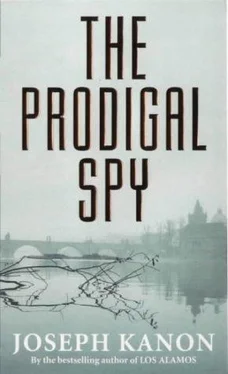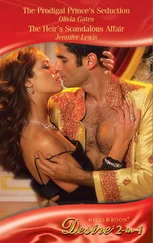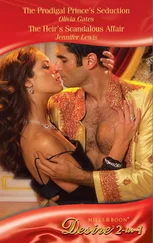The applause was for the band, not for them, but he heard it like an alarm clock, bringing him back. They were supposed to be inconspicuous, not drawing a crowd. He dragged Molly outside the circle of people and stood for a minute against the wall, catching his breath.
“Who would have thought?” she said, smiling, hanging on to him. She reached up and wiped his temple, smoothing back the damp hair.
“We’d better get back,” he said, but when he looked up he saw that his father had come to find them and was standing there watching. He felt embarrassed, as if they’d been caught necking. Molly followed his gaze and turned.
“Did you see?” she said to his father, still smiling.
“A killer-diller,” his father said wryly. “We were wondering what had happened to you.”
“My fault,” Molly said lightly. “I couldn’t resist.”
His father looked around. “How about a cigarette?” he said. Then, to Molly, “Tell Anna we’ll be right there.”
Molly looked surprised at her dismissal, but he took Nick’s arm before either of them could say anything and led him out the door. Nick felt the night air on his sweat and shivered.
“Outside?”
“Yes,” his father said, still leading him.
“Sorry. We shouldn’t have done that.”
His father waved it aside, a matter of no importance. “Here,” he said, lighting him a cigarette. “Listen to me, Nick. Carefully, please. We don’t have much time.”
Nick leaned against the building, still sweating, and took a gulp of air. Now what?
“We have to make a change.”
“What’s wrong?” he said, alert now.
His father shook his head. “Just listen. I need you to do something for me. Tomorrow morning go to the train station and buy a ticket for Vienna-you’ll need your passport. The Berlin train at eight-ten. You shouldn’t have any trouble. An American. Even at the last minute.”
“What are you talking about?”
He put his hand up. “Just listen. If it comes up, which it shouldn’t, you had a quarrel with Molly-these things happen. Take a bag with you, what you’d take if you were leaving. After you buy the ticket, go to the men’s room, the one near the platform. First stall on the right as you enter. You leave the ticket there-an accident, but you don’t realize it. You don’t miss it until the train is about to leave, so you retrace your steps, but you can’t find it. Too late. You don’t report it. But missing the train-maybe it’s a sign you should make up. So you go back to the hotel. You do make up-no need to take the train after all. But leave that afternoon. Drive to Vienna. Don’t stay in Prague any longer.” He paused, as if he’d forgotten a detail in the rush. “Don’t talk to anybody at the station. That’s important. You don’t see me, not even if we’re alone there. Do you understand?”
Nick stared at him, trying to catch up. Was he crazy? “You can’t do this.”
“Do you understand?” he repeated.
“You can’t just get on a train.”
“Yes. It’s the ticket that’s difficult. A Czech would get it early, with the visa. No one goes to Vienna at the last minute. But for you it’s easy.”
“No one goes to Vienna at all.”
“Russian Jews,” his father said. “They have exit visas. This is the train that connects to Vienna. It’s how they leave. Don’t worry, I have papers.”
“Yours?”
“Someone’s. They won’t bother me. Once I have the ticket I’m all right.”
“No risk at all.”
His father looked up at him but didn’t answer. “When you get to Vienna, stay at the Imperial. I’ll contact you. And don’t tell anyone you’re there-anyone.”
Nick dropped his cigarette and took him by the arms. “What’s going on? You can’t do this,” he said again. “What if it doesn’t work?”
“It has to. It’s not what I planned, Nick. But now we do it this way.”
“But why? This morning-”
When his father didn’t answer, it occurred to Nick, a chill like the night air, that it had always been the plan — not the elaborate exchange but an escape, clandestine like the rest of his life, drawing Nick in deeper, one story into another, until he was on a train platform buying a ticket, an accomplice. No risk at all, unless he was caught.
“What about your list?” he said. “Your documents?” Had he made that up too?
“There isn’t time now. But they’re also here,” he said, tapping his head. “It should be enough.”
If they exist at all, Nick thought. Now there were other papers, good enough to use on a train, insurance policies. How long had he had them?
But when he looked into his father’s face, he saw that the smooth confidence of the morning was gone. Now there was the worry he’d noticed earlier, something hasty and makeshift. A new plan, while Nick had gone dancing.
“What’s happened? Are you in some kind of danger?”
His father shook his head. “Not yet. I just have to do it differently.”
“Not like this. Let me go to Paris and-”
“No,” he said abruptly. “Go to Vienna. It’s important, Nick, please. Do this one thing for me. There’s no danger to you. A lost ticket-you can’t be blamed for that.”
“I wasn’t thinking about me.”
“No,” his father said, his eyes softening, as if he’d received an unexpected compliment. “So you understand?”
“How long do I wait in Vienna? If you don’t show up?”
“In that case you won’t have to wait at all,” he said, almost wry again. “But let’s hope for the best. It’s simple, Nick. Just keep your head. We’ll be all right.” He paused and looked around. “Well. We can’t stay here. You don’t want to be seen with me. Tell Anna to come out. Say I’m not feeling well.”
Nick raised his head to speak, but his father’s eyes were steady, pragmatic. There was nothing more to be said. Nick looked away. “I’ll get them.”
“Just Anna. You stay here.” A little smile. “Have another dance.”
When Nick moved from the wall, his father stopped him. “Nick?” he said, his voice anxious, then reached for him, a bear hug, no longer caring if anyone could see. The platform goodbye they weren’t supposed to have. He held Nick for a minute-the same clutch, unmistakable — then pulled away.
“What was that for?” Nick said, to cover his embarrassment.
“For luck. You always brought me luck, remember?” Sitting at his side while his father played poker with the other men, watching the cards, happy to be up late.
“Not always,” he said.
“Yes, you did.”
Inside, the band was still playing, the hall light and warm, as if nothing had happened. “Memories of You”, a romantic low-register solo, calming the crowd down after the raucous opening number. Anna left even before he’d finished his message, snatching her coat, an attentive nurse. Molly raised her eyes.
“Tired,” Nick whispered. “We’re on our own.”
She smiled, obviously pleased, and put her hand on his. He drifted with the music, relieved that they couldn’t talk. What could have happened? Something at the funeral? This morning there had been a plan. This was more like flight, the bag ready at the door. What had spooked him? “Goody, Goody”, a speakeasy song, fleshed out for the big band.
“You okay?” Molly said, looking at him.
He nodded, forcing himself to smile. Why was happiness so hard to fake? Everybody else was beaming, a kind of collective euphoria. This was the way his father had sat, not even hearing the music. He grinned. In case they could be seen from the balcony.
The band was brought back twice, and even when the curtain was down people kept clapping, reluctant to leave the party. They followed the crowd back to Wenceslas, where it spilled down the long street, clumping at tram stops and the few bars still open for a late drink. Molly wanted to go on to Laterna Magika-‘We can still catch the end’-and because they wouldn’t have to talk there either he went along, his arm around her shoulder, not giving anything away.
Читать дальше












